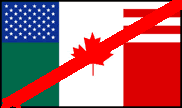
A "Family" Crisis at the United Nations
By Wendy McElroy
In 1979, the General Assembly of the United Nations (UN) passed the Convention on the Elimination of All Forms of Discrimination Against Women (CEDAW), which the United States has yet to ratify. Also in 1979 -- the International Year of the Child -- the UN began discussion of a draft agreement on the rights of children, which resulted in the Convention on the Rights of the Child (CRC). Adopted in November 1989, the CRC remains unratified by the United States. Both documents have become flash points of controversy.
The UN itself evolved from the Declaration of United Nations, signed in 1942, through which twenty-six nations pledged to support the Allies during World War II and to work toward peace thereafter. Libertarians have long been critical of the UN, viewing it as a step toward a collective global government. The criticism became outright condemnation as the UN's peacekeeping role assumed a more military air. For example, SFOR -- the "Stabilization Force" of tens of thousands of troops in Bosnia-Herzegovina -- operated under the authority of a UN Security Council Resolution. The fear of World Government was made more real by the Millennium Summit (2000) at which the UN assembly considered proposals to establish a UN bank that issued currency, a permanent standing army of its own, and UN control of international financial institutions.
Today, influential conservative groups are adding their own unique criticisms of the UN. Specifically, the Family Research Council and the Heritage Foundation accuse factions within the organization of interpreting both the CRC and CEDAW according to a radical feminist ideology that seeks to subvert the family, national sovereignty and religion. The Family Research Council recently published a collection of essays entitled "Fifty Years after the Declaration: The United Nations' Record on Human Rights." In the book, nearly two dozens experts roundly criticize the recent social policies of the UN as they relate to women, abortion, and children's rights. Teresa Wagner, the editor, charges that the UN's Universal Declaration of Human Rights "has become a tool...to advance abortion, homosexuality, euthanasia and other destructive causes..."
Meanwhile, on February 5, 2001, the Heritage Foundation issued a report entitled "How U.N. Conventions on Women's and Children's Rights Undermine Family, Religion, and Sovereignty" by Patrick F. Fagan, a former Bush administration official. The Heritage report claims that, under "the political cover of international treaties that promote women's and children's rights," the committees that "oversee implementation of U.N. treaties in social policy areas and the special-interest groups assisting them" are pressuring nations to change their laws in a manner that reflects an anti-family, pro-feminist ideology. To such conservative organizations, the UN has become anti-family.
Perhaps a more accurate statement is that the UN is currently experiencing an ideological conflict between Committees who condemn the traditional family and powerful forces that call upon the UN to protect that institution.
Indeed, the conflict has become so public and the right-wing has become so effective that radical feminists -- who generally pursue a strategy of ignoring opposing opinions -- have issued their own reports on what they call an "anti-feminist" onslaught. For example, in the wake of the 44th Session of the UN Commission on the Status of Women (March 2000), Anick Druelle prepared a report entitled "Right-Wing Anti-Feminist Groups at the United Nations" which was funded by the Canadian government.
It has taken years for the conflict over family within the UN to emerge publicly. Part of the reason is that the shift toward anti-family policies has been gradual. For example, the UN's Universal Declaration of Human Rights (1948) proclaims that the "family" is entitled to protection by society and state and speaks of nurturing motherhood. Especially since the Fourth's Women's Conference in Beijing (1995), however, that provision has come under increasing assault. The low profile with which the UN's new feminist agenda has operated is also due to the vague and seemly innocuous terms being used to describe it -- e.g. "gender mainstreaming." Moreover, these terms are often embedded deeply within tedious mega-documents that most members of the UN probably do not read in toto.(emp added)
But now that the light of controversy is shed upon UN policies regarding family, let us consider whether the influential feminist groups operating within the UN are, in fact, anti-family?
Feminism within the UN
read the rest
Concerned Women for America has provided Biblical support for six core issues, which go to the heart of our Western Values in which the functional family unit is key. In addition, CWA has been following CEDAW since it was spawned in the UN, and they have a lot to report on the organization's committee rulings.
I have looked into Wendy McElroy a bit. Perhaps it may seem presumptuous of me, but I'm new at this and need to check out anyone I recommend. I can say this without hesitation: Wendy McElroy is a woman who can think on her feet (a superlative recommendation from yours truly). What I have read of her writing, she is very adept at pulling back the curtain sham of the politicization of women's role in today's society, and exposing the radical feminist's goals.
This is very necessary in order to understand and refute the idiocy being perpetrated on women and children, who in the Radical Feminist's war on the prevailing patriarchy, have become mere pawns, expendable and ultimately discardable.
It's all part of the "Criticise, criticise, poke out their eyes" mentality. In the Feminist View, all who don't espouse the party line are guilty of supporting the patriachy - ergo, they are beneath contempt. It's not okay to be a lady.
Ladies, toss these misguided souls out on their respective derrières.
Thursday, April 26, 2007
The United Nations is Anti-family
Posted by
No Apology
at
7:25 PM
![]()
Labels: anti-family, child's rights, CRC, Heritage House, UN. CEDAW, Wendy McElroy







